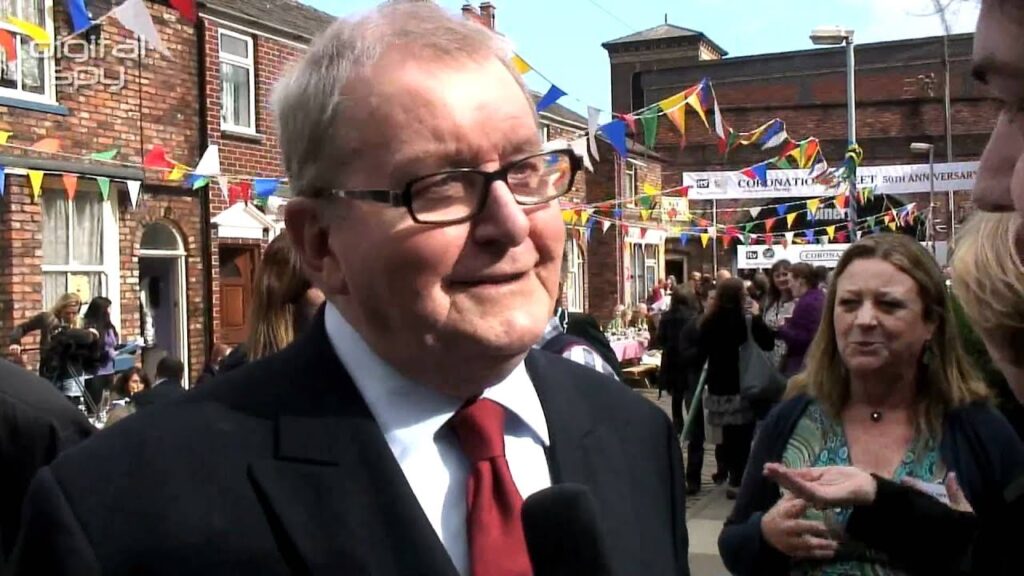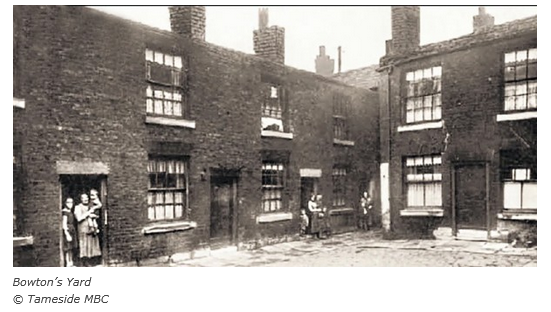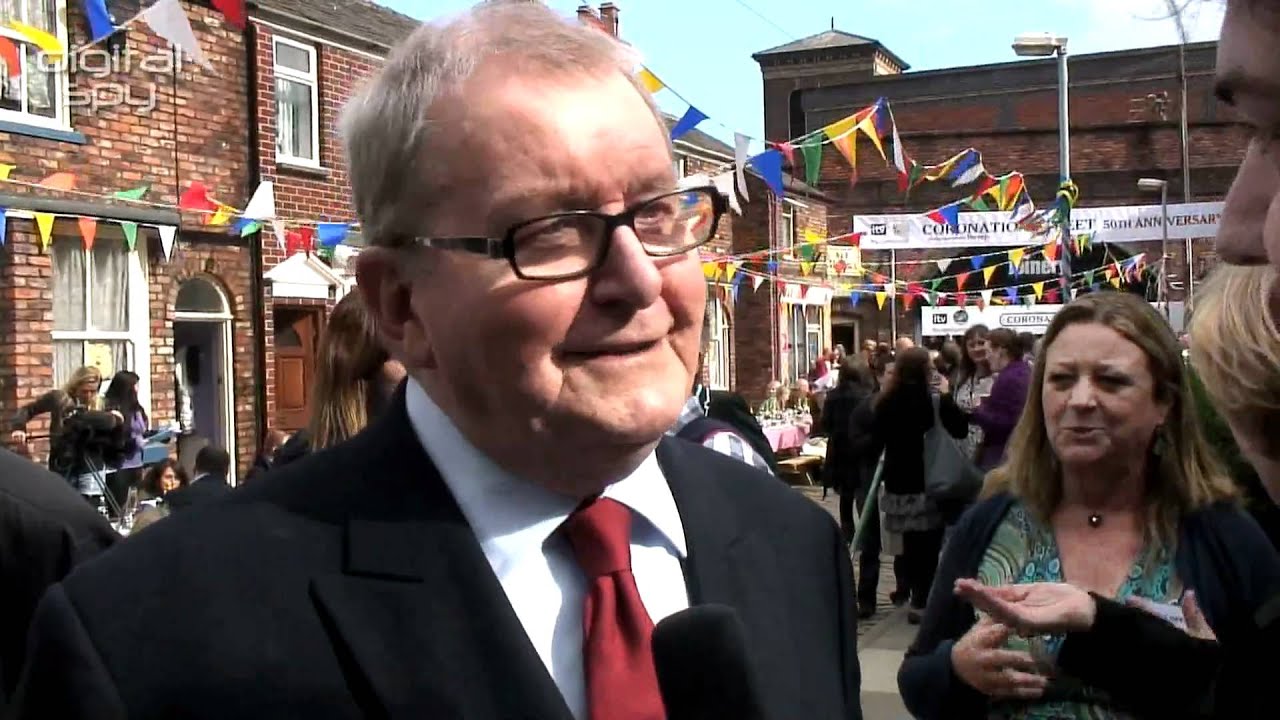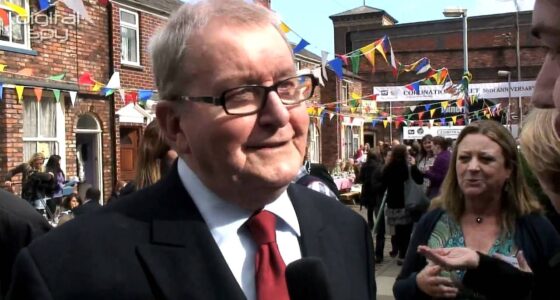Vicky takes a look back at Tony Warren’s legacy, and how he became a trailblazer for LGBT representation within British soaps.
Roll the closing credits of any Coronation Street episode and two things are constant. First is the unmistakable brass band theme tune that can send the neighbourhood dogs into a howling frenzy (if you don’t believe me, check out ‘dogs sing Coronation Street’ via any half-decent search engine). The second constant? Four words: Created by Tony Warren.
He has been called the ‘original Godfather of UK soap‘ (Eastenders actor Adam Woodyatt), a ‘genius of our time’ (Helen Worth), and a ‘sissyish little boy‘ (a self-deprecating Tony Warren). A man of great character and presence, it is clear Tony Warren was one of a kind.
But just how much do we know about the man behind the world’s longest-running TV serial? What do we think he’d make of life on the cobbles today and why is he such an icon of the LGBT community?

Capturing his world
It’s 1940s northern England. A small boy sits under his grandma’s table peeping out from beneath the chenille tablecloth. He isn’t hiding, nor is he in disgrace. He is, in fact, captivated by, and listening to, countless conversations that pass over the table. Conversations dominated by his grandma, aunt and other female relatives and friends. It is here where a young Tony Warren listens and absorbs. He notes the rhythm of the voices, patterns of speech, and humorous anecdotes. It is here where the first seeds of Coronation Street are sown.
Tony Warren was born Anthony McVay Simpson in 1963. Born in Eccles and raised in Pendlebury, his family had something of the performer gene – his grandfather was a champion clog dancer (who knew there was even such a thing) and his father played the musical saw when not at his day job as a fruiterer. Young Anthony would go round old people’s homes with his cousin Roy, putting on puppet shows for the residents. He was theatrical and he was flamboyant.

Whilst at school, he was teased by his peers for being small and posh and he would play truant. School was not for him. It was at the Elliott-Clarke Theatre School in Liverpool where Anthony trained as a young actor and adopted his stage name of Tony Warren. However, he was expelled from the school after 18 months for ‘rabble-rousing’. He had a regular role on BBC Children’s Hour where he would work alongside the likes of future Coronation Street legends Violet Carson (Ena Sharples) and Doris Speed (Annie Walker). It was the former who may have helped inspire Warren to create something that would change the shape of British television.
In 1950 Violet Carson performed the song, ‘Bowton’s Yard’ on the piano. The song is based on a 19th century poem which tells of 12 working-class northern houses, their inhabitants and all their goings-on. Amongst them is a bad-tempered landlady, a local brass band, and Ned Grimshaw with his shop, selling ‘Eccles cakes, an’ gingerbread, an’ treacle-beer an’ pop’.
This gritty, down-to-earth look at working-class life was a world Warren wanted to preserve like ‘flies in amber’.

Reflections of society
The 1950s and 60s in Britain saw the arts shifting towards kitchen-sink dramas centred around the working-class. Industrial cities such as Nottingham and Manchester played as much part in films as the actors themselves. Prior to this, London and BBC English had been the norm, now films and TV were made complete with regional locations and accents. Uncompromising depictions of class conflict and young people alienated from society shocked audiences, but also struck a chord. It was raw, honest, and relatable.
Did you know? Tony Warren had, in 1956, sent his idea of a gritty, kitchen sink drama called “Our Street” to the BBC. He never got a reply.
The young boy who had absorbed his granny’s conversations was now absorbing the societal changes around him. Unfortunately Tony Warren felt unfulfilled, finding himself writing on Granada TV’s Biggles, a children’s show about a villain-fighting air detective. Warren knew nothing of this topic and having had enough one day in 1959, he lost his cool completely and sat atop a filing cabinet, clasping a vase of chrysanthemums, in a strop. He refused to come down until he could write about something he knew about. (You can see this memorable scene recreated in ITV’s The Road to Coronation Street.) To pacify him, Harry Elton, producer at Granada TV, gave him 24 hours to come up with an alternative show. Something real, something original.
Warren went home that night and wrote about what he knew, what he’d heard when earwigging under the table and what he’d observed at his local Swinton precinct as a kid. Within those 24 hours he had a complete 30-minute script for Florizel Street. Elton and Warren pitched the idea to ITV managers and eventually earned a commission of 13 episodes. Despite a mixed reception with critics, the characters resonated with audiences. Viewers quickly realised they were watching themselves on the small screen.
Did you know? Florizel Street was the original working title until a cleaner at Granada TV studios commented it that it sounded like a disinfectant.
LGBT Pioneer
Tony Warren knew he was gay from a young age but did not feel comfortable coming out to his family. He was fascinated with life in the back streets of Manchester and the flamboyant gay culture, which was reflected in him placing strong, older female characters and often-camp humour as cornerstones of Corrie. As a result, the show has held an iconic status in the gay community for a number of years.
However in the 1960s, Corrie’s creator faced much prejudice and homophobia. He was not openly gay, as prior to 1967 male homosexuality was illegal, but trusted friends at Granada knew. Warren said he’d often wonder to himself if he was going to end up in Strangeways prison. The homophobia he observed was repeatedly from his own colleagues. After one wearisome meeting of endless ‘poof’ jibes, in typically inspiring fashion, Warren stood up and declared ‘I’d like to remind you that without a poof, none of you would be in work this morning’.
Despite the prejudices and judgements, Warren was determined to see his creation on screen. He admitted that had he not been gay, he would not have been able to create Coronation Street. In a particularly poignant quote, he notes ‘the outsider sees more, hears more, has to remember more to survive’.
LGBT representation on our favourite soap unfortunately took a long time to be seen. Writers and producers over the years have stated they didn’t want to bring in a gay character just for the sake of it. It took 43 years for the first gay storyline to hit our screens, when Todd Grimshaw (Bruno Langley) kissed Nick Tilsley (Adam Rickett) in 2003. 14 million viewers tuned in for that episode and there were 16 complaints to the Independent Television Commission. All 16 complaints were rejected. Ironically, for a ground-breaking soap opera created by an openly gay man, Corrie had to catch up to both Eastenders (whose first gay storyline was 1986) and Brookside (Beth Jordache and Margaret Clemence’s lesbian storyline was 1994).

Tony Warren sadly passed away in 2016, but in his later years, he witnessed Corrie somewhat redressing the balance in LGBT representation. Gay characters such as Todd, Sean Tully, Billy Mayhew and Marcus Dent had arrived in the Street whilst lesbian representation came through Sophie Webster, Sian Powers and Maddie Heath. Possibly the most notable moment was the gender identity representation through the introduction of the wonderful Hayley Cropper. She graced the cobbles from 1998-2014 and was the first transgender character in a British soap opera. In true Tony Warren style, Coronation Street continued to push the boundaries and produce ground-breaking storylines.
Did you know? Tony Warren had a cameo appearance in the live episode in December 2010 which celebrated Coronation Street’s 50th anniversary.
Over the last decade Corrie has further increased its diversity inclusion and LGBT representation. At the 2017 PinkNews Awards, the Street was recognised for its inclusion of LGBT characters. Daniel Brocklebank (Billy Mayhew) collected the award and acknowledged the massive influence of Tony Warren in his acceptance speech.
The pairing of Rana Habeeb and Kate Connor (let’s not talk about how that one ended) tackled not only coming out for Rana, but also the issue of faith. Summer Spellman had three Dads with Billy, Paul and Todd, and the recent introduction of Theo has brought in the topic of conversion therapy, proving that the Street has not shied away from heavy issues. And of course in the last year, the pairing that has really struck a chord with the fans, is Swarla.

Carla, Lisa and Betsy are representing a multitude of people – those who may be heterosexual for many years but have a ‘gay awakening’, daughters with two mums, or lesbians working in male-dominated industries. I think it’s fair to say Tony Warren would be thrilled to see the story development of Lisa and Carla’s loving and healthy relationship.
To see that representation in our soaps is so important. After all, that’s how Coronation Street first started – the hunger for the soap arose because people saw themselves in the characters. They felt seen. And that is all down to the vision and the strength of Tony Warren. Imagine having no Coronation Street. Imagine no Rovers Return. Imagine there never having been a Ken Barlow, Rita Fairclough, Carla Connor or Steve McDonald.
At the risk of turning this into a John Lennon song, I’ll stop there. You get the gist. Coronation Street has had such an impact on so many lives over the last 64 years through its humour, realism and relatable characters. But without doubt the best character Coronation Street has ever had is Anthony McVay Simpson himself.
Thank you, Tony Warren OBE!


